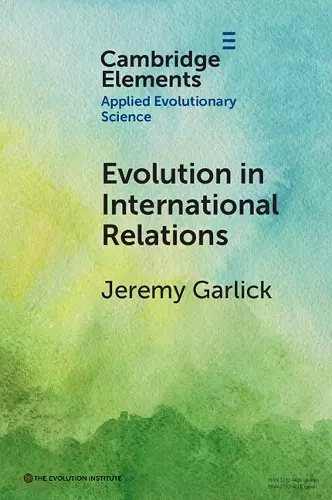Evolution in International Relations
Format:Paperback
Publisher:Cambridge University Press
Published:6th Mar '25
Currently unavailable, and unfortunately no date known when it will be back
This paperback is available in another edition too:
- Hardback£55.00(9781009464161)

This Element applies key insights from evolutionary biology, evolutionary psychology, and neuroscience to International Relations.
This pathbreaking Element will attempt to apply insights from evolutionary biology, evolutionary psychology, neuroscience, and archaeogenetics to IR. Among such insights are the evolved role of emotions in decision-making, intergroup competition as a driver of in-group cooperation, and culture, morality, and language as group-binding mechanisms.Scholars of international relations (IR) and evolution pay little attention to each other's fields. However, there is a need to examine evolution's impacts in IR. International actors such as nations are made up of people, so evolved human nature has an impact on relations within and between states. Accordingly, this pathbreaking Element will attempt to apply insights from evolutionary biology, evolutionary psychology, neuroscience, and archaeogenetics to IR. Among such insights are the evolved role of emotions in decision-making, intergroup competition as a driver of in-group cooperation, and culture, morality, and language as group-binding mechanisms. Homo sapiens is a primate, so comparison with the behaviours of other great apes reveals some commonalities in terms of group dynamics, status, and hierarchies, as well as the enduring human capacity for both in-group cooperation and organised violence against other groups. These have an evolutionary basis that is relevant to IR theory and practice.
ISBN: 9781009464147
Dimensions: 229mm x 152mm x 5mm
Weight: 141g
86 pages